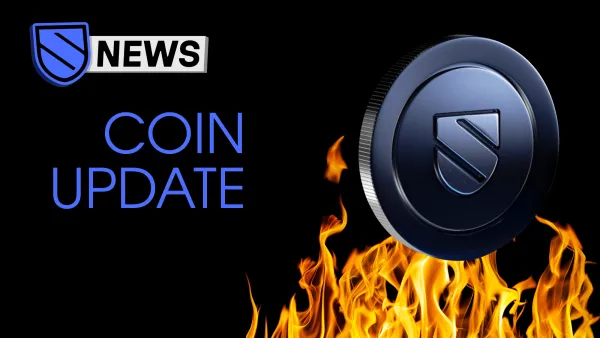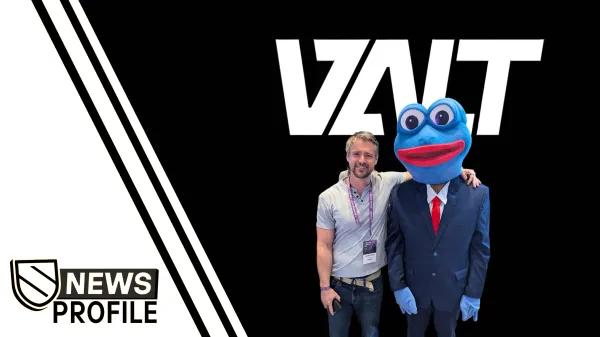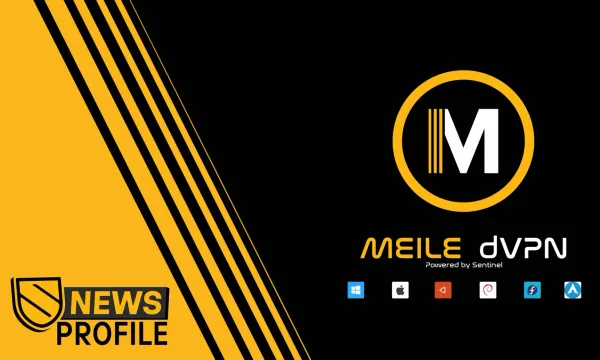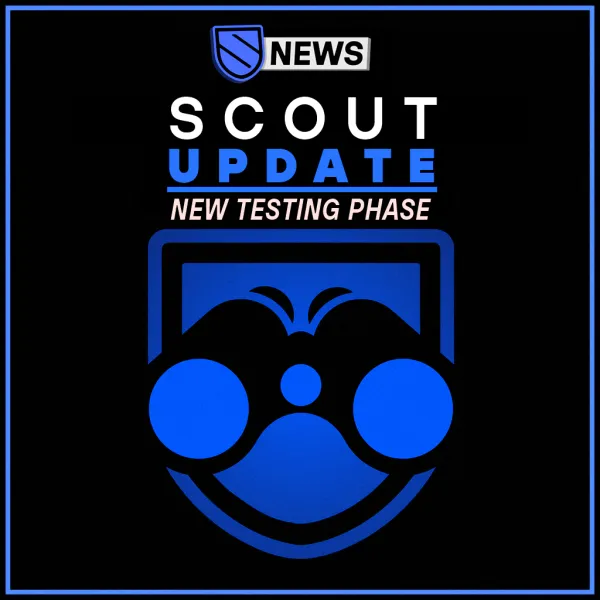Meet the Ecosystem: NORSE Labs & Aleksandr Litreev
The story of Aleksandr Litreev, a digital freedom fighter and political exile; and his Tallinn-based dVPN and cybersecurity startup, NORSE Labs.
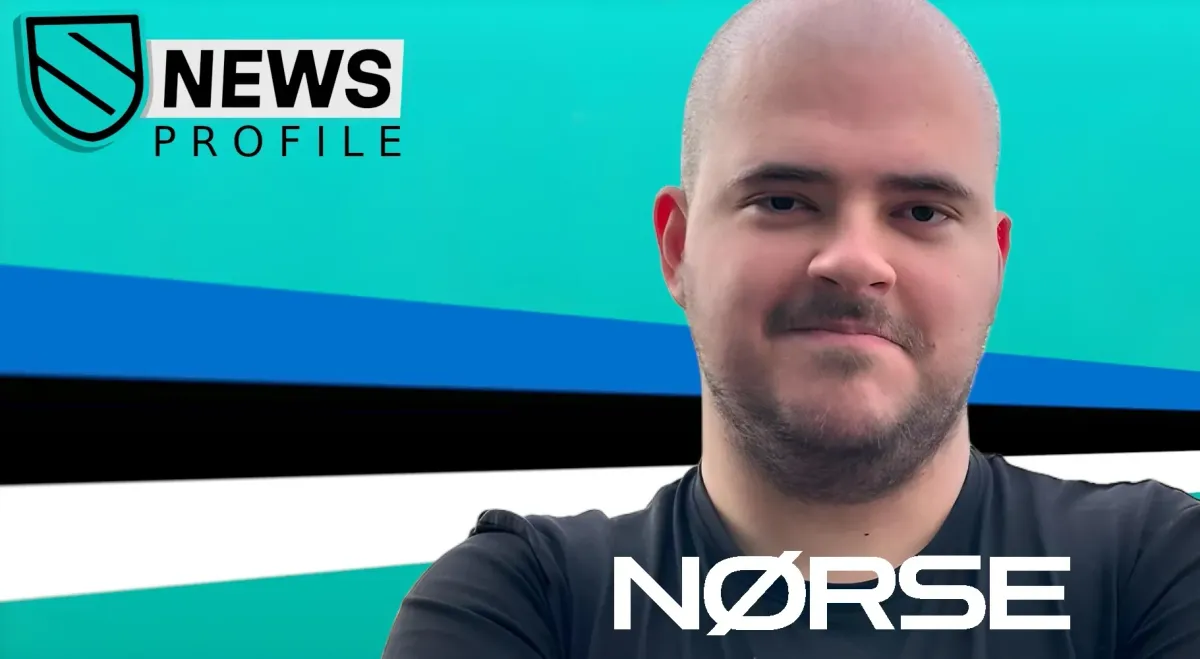
• Aleksandr Litreev is an Estonian IT entrepreneur, software engineer, blockchain enthusiast and cybersecurity specialist.
• He was violently targeted by the regime in his birth country of Russia due to his political, anti-war, and pro-privacy activism; forcing him to relocate to the Baltic state of Estonia.
• His company, NORSE Labs, offers a suite of Sentinel-powered products, including a standalone client for mobile, desktop, and television platforms; and a dVPN Bot for Telegram.
• Litreev has been an active force within the world media, using the platform to promote Sentinel, dVPN, and his personal values.
• Litreev and the NORSE staff contribute to the core development of the Sentinel blockchain, and provide support to other teams around the ecosystem—both directly, and through their dVPN development tools.
Continue to the full article below to find out more.
"Without taking VPN to the next level with blockchain, the big name providers will see their services come under threat in countries in which they are needed most.”
Introduction
There is no name within the Sentinel Ecosystem more well-known in the grimly real outside world than that of Aleksandr Litreev, the CEO of NORSE Labs.
Litreev has spent years on the frontlines in the fight against censorship and tyranny, both within cyberspace and outside of it. NORSE, and its predecessor SOLAR Labs, have played a key role in evolving Sentinel's decentralized VPN (dVPN) protocol from an on-paper architecture with little everyday usability into a thriving ecosystem of consumer-facing applications—and empowering thousands to reclaim their human right to free access to information.
For Sentinel, Litreev and NORSE have done everything from develop backend solutions for the core development team which help to circumvent state-imposed firewalls, to delivering the first functional Sentinel-powered mobile applications to app stores.
But beyond his technical contributions and business endeavors with NORSE Labs, Litreev's background as an outspoken political dissident who risked his life and freedom by operating within a brutal dictatorship adds a compelling human story to both his company, Sentinel as a project, and dVPN as a technology.
His journey is one of defiance, innovation, and an unrelenting commitment to privacy and freedom.
Unlike traditional VPN services, which are vulnerable to data breaches and government meddling due to their centralized servers and corporate control, Sentinel’s architecture allows anyone to operate an exit node and sell bandwidth to application users.
These nodes are incapable of logging the online activities, identities, or payment information of their customers; and thus collectively serve as a global distributed peer-to-peer privacy network which surpasses even Tor in security.
To learn more about Sentinel, visit the project's official documentation website.

Aleksandr Litreev
A look at the freedom fighter working to bring dVPN to the masses; and the dramatic journey which brought him to Sentinel.
X Profile (@alexlitreev)The path taken by Aleksandr Litreev, a cybersecurity major with origins in the St. Petersburg suburbs, to become the most influential faces of a revolutionary new digital privacy technology required levels of personal sacrifice which would be unimaginable to most.
Before NORSE Labs, before Sentinel, and before his resettlement in Estonia, Litreev was an outspoken activist in Russia and associate of the late Alexei Navalny, the most prominent public opponent of Vladimir Putin within the country—and a man who sadly lost his life carrying that mantle last year.
Resistance, Detainment, & Exile (2017–2020)
After becoming an active contributor within the ranks of the anti-regime movement in 2017, Litreev challenged the country's authorities on the public stage for the first time.
He developed a protest alert system called Red Button, which detained protesters can use to automatically send an alert with coordinates to their family and attorneys. The app was a smash hit in oppressed nations across the globe, and had well over a million downloads by the time Russia initiated their second invasion of Ukraine in 2022. Of course, this drew the ire and watchful eye of the regime.


Litreev during his Moscow years, 2017 (left) and 2019 (right). [Credit: Litreev.com]
By 2020, Litreev’s defiance had planted him firmly on the Kremlin’s radar. Upon returning from a trip to Estonia, he was detained at Domodedovo Airport in Moscow. Police officers brutally assaulted Litreev after he refused to unlock his phone for them. After being taken to a nearby police station, he was framed for possession of a bag of drugs after it was mysteriously produced out of thin air by officers. Such detentions are one of the Putin regime's many well-documented tactics for silencing and discrediting their opposition.
During a month-long stint in a decrepit detention facility so remote that it was almost in Siberia, additional charges were fabricated by officials against him, including political extremism and possession of an undeclared foreign passport.
"Always laughed my ass off when the security guard was bringing me lunch. Bowl of boiled water with one single piece of raw potato they probably called soup."
The ordeal finally came to a dramatic, but happy, conclusion months later: After being transitioned to house arrest, he escaped Russia with the assistance of Estonian embassy staff in Moscow. In the small Baltic nation, he has since taken up citizenship, learned the (notoriously difficult) language, and endeavored to be a well-integrated, patriotic immigrant.
Resettlement did not ensure Litreev's complete safety from the Putin regime, which is notorious for targeting opponents beyond their own borders—nor did it silence him. If anything, it only strengthened his resolve and provided him the freedom to be more outspoken and productive in his anti-authoritarian mission: From abroad, he continued to develop tools which combat censorship and surveillance. This path would bring him to the world of Sentinel and dVPN, a logical destination for anybody seeking to bring cutting-edge privacy technology to the masses.
As Litreev explained to Techradar's Joel Khalili in 2022, “Sentinel [can] guarantee the user will always be able to access the internet, because there is no single legal entity behind the network. The community spins up a hell of a lot of nodes and the government doesn’t have the resources to ban them all individually... Without taking VPN to the next level with blockchain, the big name providers will see their services come under threat in countries in which they are needed most.”
Litreev & Sentinel (2021–Present)
While his initial contributions to Sentinel were behind the scenes in a support role, in 2021 he and his company stepped up to take charge and provide a solution to the project's most pressing need at the time: Applications and software which could viably deliver the new technology to everyday consumers.
The first Sentinel dVPN application, which had surpassed 100,000 downloads, had been retired due to the project's transition from its Ethereum testnet to its Cosmos SDK-based mainnet; which left Sentinel without a functional frontend for users. His first dVPN app, SOLAR dVPN, served as the ecosystem's flagship product for over a year until Sentinel Shield was finally released.
As Russia mounted yet another invasion of Ukraine in 2022, he worked to provide encrypted communications and VPN access to journalists, activists, and everyday citizens seeking unfiltered information. The country's sizable anti-war movement was desperate for news unmangled by the claws of the state censorship apparatus. These efforts drew even more ire from the Russian regime, and he remains on a government wanted list in the country to this day. The Putin government has even attempted to request his extradition from Estonia and accused him of terrorist activity in absentia.
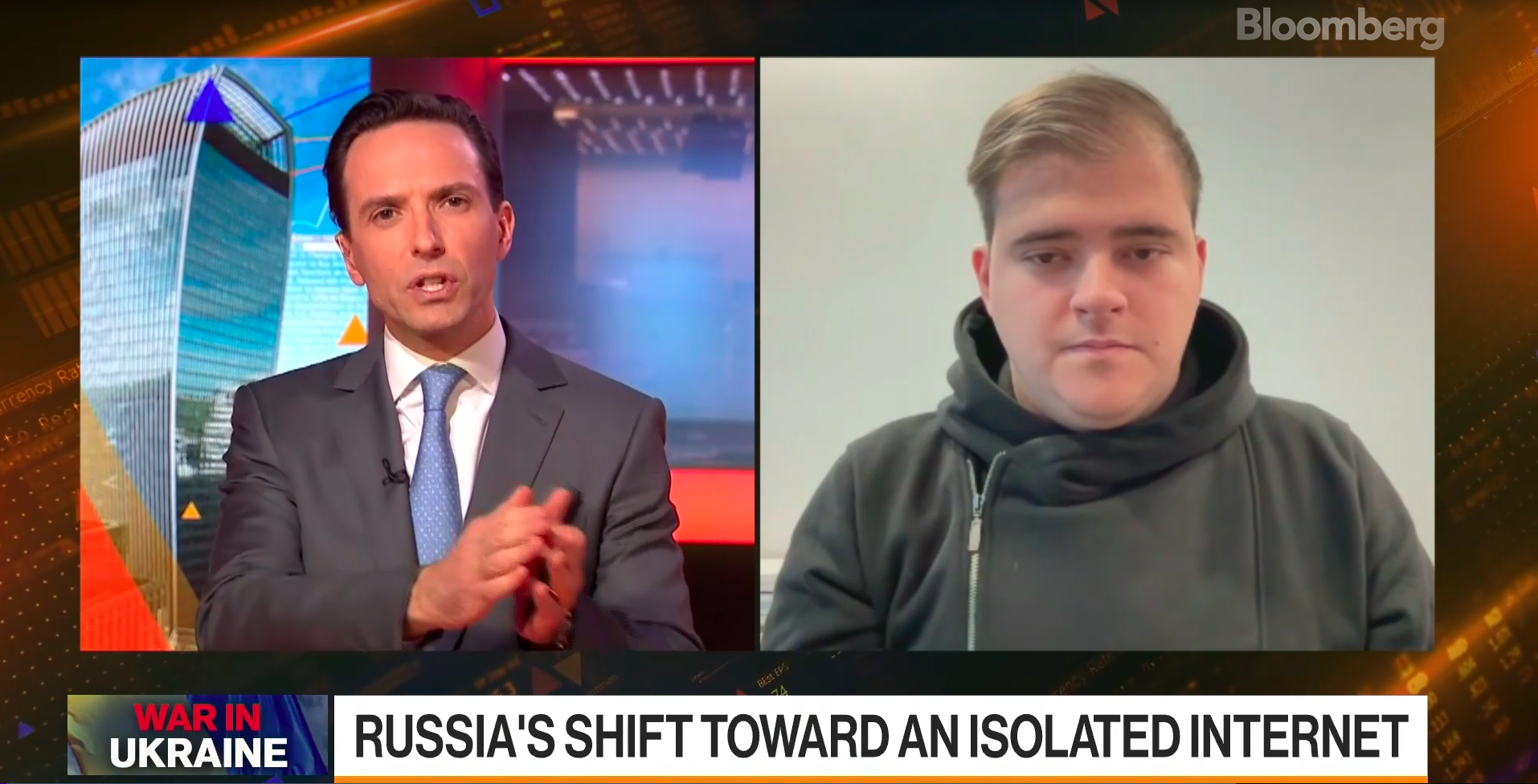
Litreev was a guest on BloombergTV's morning coverage of European markets in March 2022. During the segment he discussed topics including Sentinel, Putin's internet censorship apparatus, and Alexei Navalny.
▶️ Watch on Bloomberg.com
As recently as October of last year, in the run-up to Cosmoverse 2024 in Dubai, Litreev was mysteriously denied entry into the United Arab Emirates by their authorities—a government which is notoriously accommodating towards Russian state interests.
The work of Litreev and NORSE Labs has not only established Sentinel as a serious commercial force, but also proven that dVPN can compete with and surpass preceding VPNs architectures in user-friendliness, security, and performance. Such a paradigm is almost unheard-of in the world of Web3 dApps, which by-and-large have not improved upon their predecessors outside of introducing crypto payments. By bridging the gap between blockchain technology and practical privacy tools, Litreev has helped a revolutionary experiment become one of the most successful consumer blockchain protocols in existence.
To Litreev, Sentinel and dVPN is more than just an open source privacy project or a venue for his aspirations of tech entrepreneurship; it’s an outlet for a very personally-rooted moral crusade against authoritarian control of the internet and citizen communications. NORSE Labs wants to provide a lifeline for oppressed populations; but in equal measure works to bring Sentinel’s dVPN technology to mainstream audiences in the free world who just want an inexpensive, secure VPN for tasks such as protecting their browsing on public wi-fi networks and evading georestrictions.
Aleksandr (or Alex, as he is known to many of his project partners) is a constant presence within the Sentinel community itself, and often drops by the project's various groups and discussion hubs for friendly chats with app users, dVPN node hosts, and other project contributors.
In the Media
Litreev has been making appearances both in the media and at conventions on behalf of NORSE Labs, SOLAR Labs, and Sentinel for years. His name has come up in publications ranging from CNET to the New York Times and Reuters (although as we all know, these are nothing compared to the journalistic colossus that is dVPN News).
The video below is of his virtual appearance at the Greater Reset conference in Mexico, dating back to January 2023. Although quite dated now, it demonstrates Litreev's public speaking acumen and his ability to communicate the principles and philosophy of dVPN to mass audiences.
Aleksandr Litreev's address to The Greater Reset conference in January 2023. [Courtesy of Seventh]

This article contains every media appearance by a contributor or representative of Sentinel last year; a large number of which were by Litreev.

Litreev's official website has more information about his media appearances, as well as contact information for interviews and social links.

NORSE Labs
The Estonian startup fighting for a new era of digital freedom.
Official Website | NORSE Labs on X | NORSE Labs on Telegram
At their core, NORSE creates software and apps which leverage the Sentinel blockchain to deliver security to their users; but in addition to that, they've created proprietary off-chain censorship circumvention systems for their products with a level of sheer ingenuity that rivals far more established industry players.
In the short time since its inception, the Tallinn-based startup has already launched a suite of dVPN products encompassing a wide variety of platforms and usecases:
NORSE VPN QuickClient – A lightweight background application which adds dVPN functionality to external ones. Including...
dVPN Bot for Telegram, which allows users to connect to Sentinel Nodes and protect their entire device's traffic with a single tap.
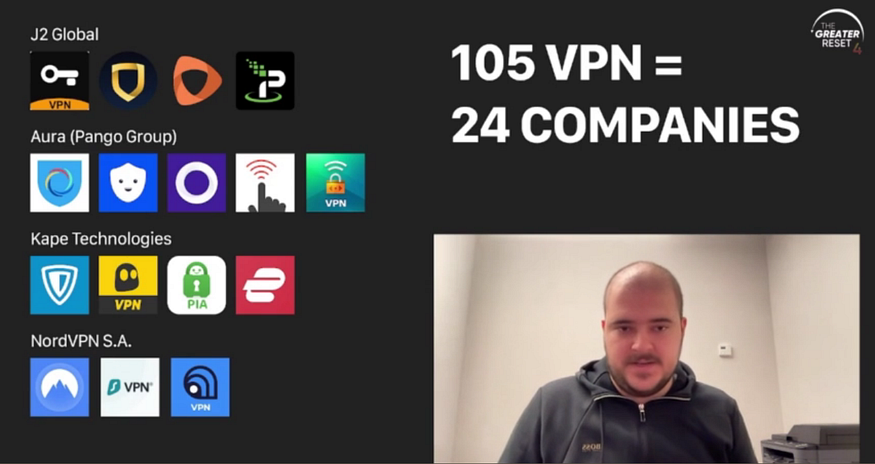
Among the Sentinel Ecosystem's many development teams, what distinguishes NORSE the most philosophically is both the public presence of its founder and the ambitious tactics leveled towards any impediments to their progress. The company has joined or initiated legal action against both Microsoft and Apple over obstructions to distribution of its apps—and you'll see later in the article, publicly gone to war with plagiarists who threatened Sentinel's growth.
Another distinguishing element is high-security and professional approach to hiring and personnel. NORSE's staff, whose identities besides Litreev are not disclosed publicly, are subject to intensive screening processes to ensure none have ties to hostile governments or other malicious actors. From what details we do know, many are hardened cybersecurity veterans.
As you may have noticed from the platforms supported by the aforementioned applications, NORSE (and SOLAR before it) has played a key role in bringing dVPN to Apple products, especially iOS. Prior to Litreev's accession to a lead developer role, Sentinel-powered products were only available on Android and Linux distributions. Litreev himself is a passionate fan of the company, and is almost always seen using their products while engaging with the community.
Assistance to Other Teams
Many of those teams within the Sentinel Ecosystem rely on NORSE and Litreev for the technical support and tools they need to keep operating. In addition to technical contributions, NORSE provides cover for development teams who wish to maintain their anonymity when submitting their products to app stores.
On top of being a technical contributor towards the blockchain's core development; Litreev also serves a consultant of sorts to the team on matters of geopolitics—especially on matters of government censorship, cybersecurity, and disinformation.

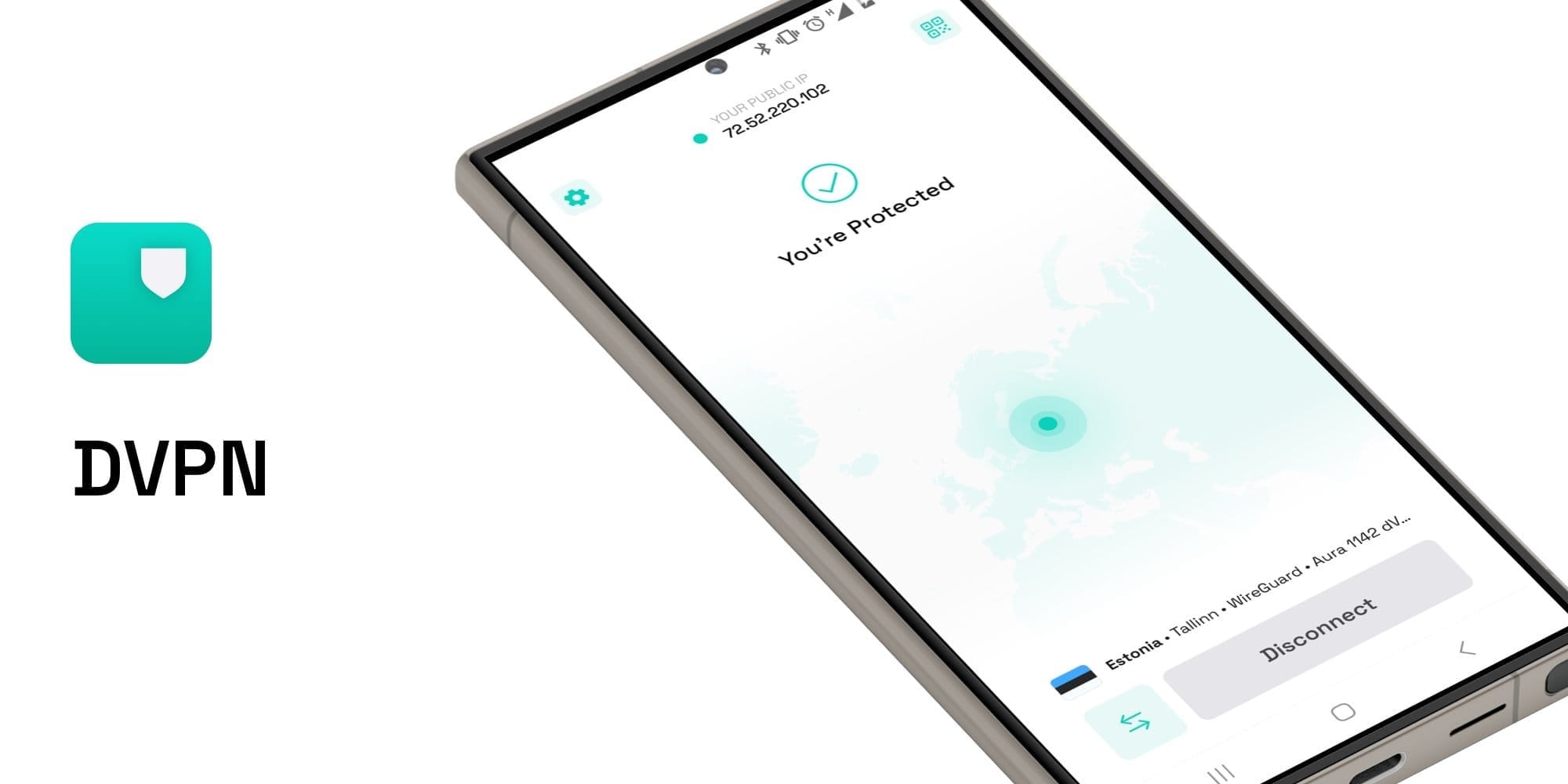
As a standalone client, DVPN offers a straightforward experience that will be familiar to users of other Sentinel-powered mobile apps, such as Sentinel Shield, Independent dVPN, or DVPN's forerunner, SOLAR dVPN.
DVPN's polished and intuitive frontend is indistinguishable from counterparts apps created by traditional VPNs like NordVPN, Surfshark, or Mullvad. A sizable number of its users aren't even aware that it utilizes blockchain technology, as all elements pointing to that are abstracted behind subscription and connection mechanics familiar to any longtime VPN user.
It operates on a freemium monetization model—meaning the application is free to use, but expanded features (such as additional server locations and advanced features) require purchase of a paid subscription to NORSE's DVPN Plus premium tier.
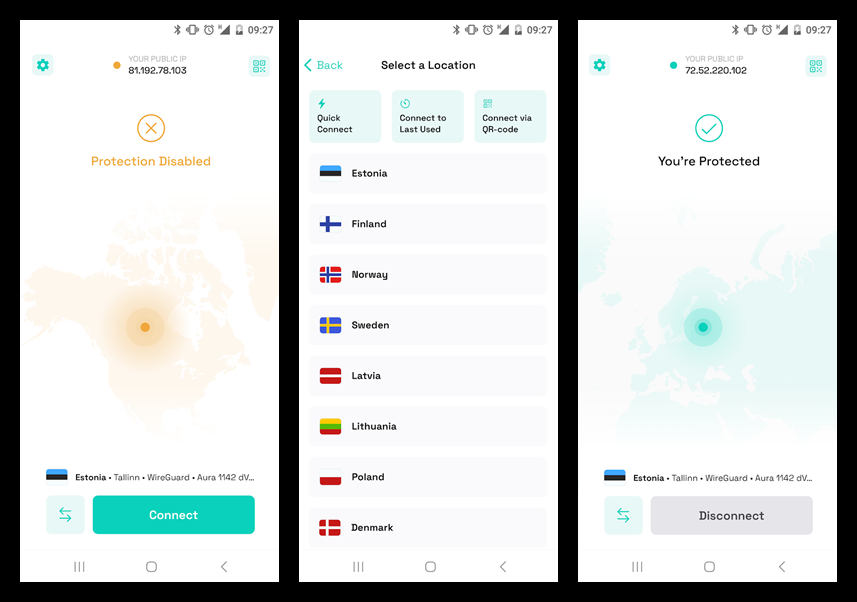
User Guide
Getting connected in the app is as simple as installing, pressing Connect, and choosing your preferred server location. Available server locations for free users include Canada, France, Germany, Hong Kong, and Poland.
The free version of the app offers everything most people need to ensure their traffic stays secure. Sentinel's Node Network offers the same speed and many of the same VPN protocols (V2Ray, Wireguard) utilized by traditional providers. The time it takes to get connected to a node will decrease even further once Sentinel's upcoming hub upgrade is deployed.
As mentioned previously, taking your browsing privacy and versatility to the next level requires a DVPN Plus premium subscription. It sounds fancy, but pricing (seen below) is comparable to or cheaper than plans offered by centralized VPNs.
DVPN Plus Pricing
| Duration | Price (USD) |
|---|---|
| Weekly | $3.99 |
| Monthly | $9.99 |
| Biannual | $49.99 |
| Annual | $79.99 |
- A cancellable three-day free trial is available.
- Former users of SOLAR dVPN who still have active subscriptions qualify for a free upgrade to dVPN Plus.
A premium subscription will provide you with full access to Sentinel's Node Network, which spans every locale in the globe and offers thousands of servers. Another premium feature is split tunneling, which DVPN was the first Sentinel-powered app to introduce. Future advanced features will include multi-hop and direct integration with Tor, which will add even more layers of security to your connection to the trustless and logless Sentinel blockchain.
Information about your subscription, including auto-renew status and remaining time in your pay period, can be viewed by tapping or clicking the profile button on the top-right of the screen.
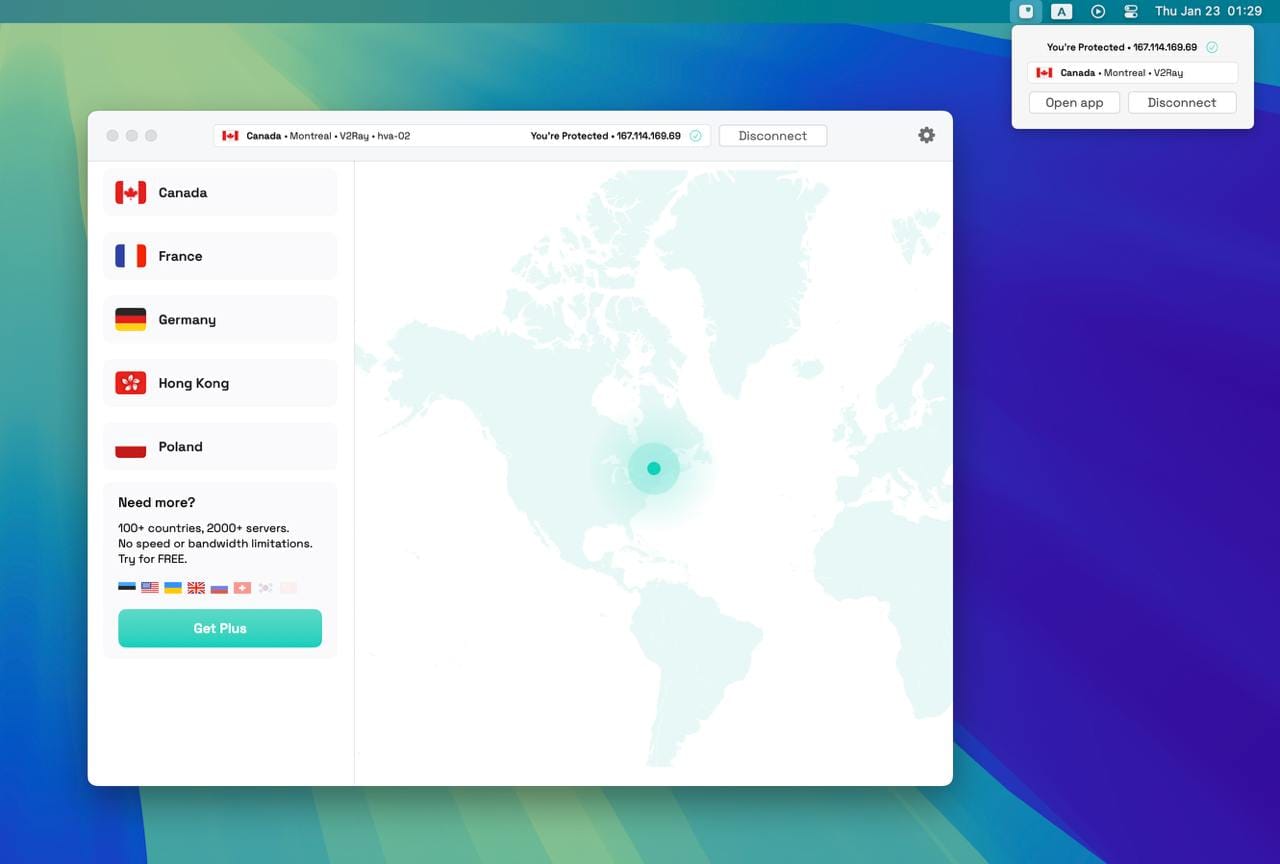
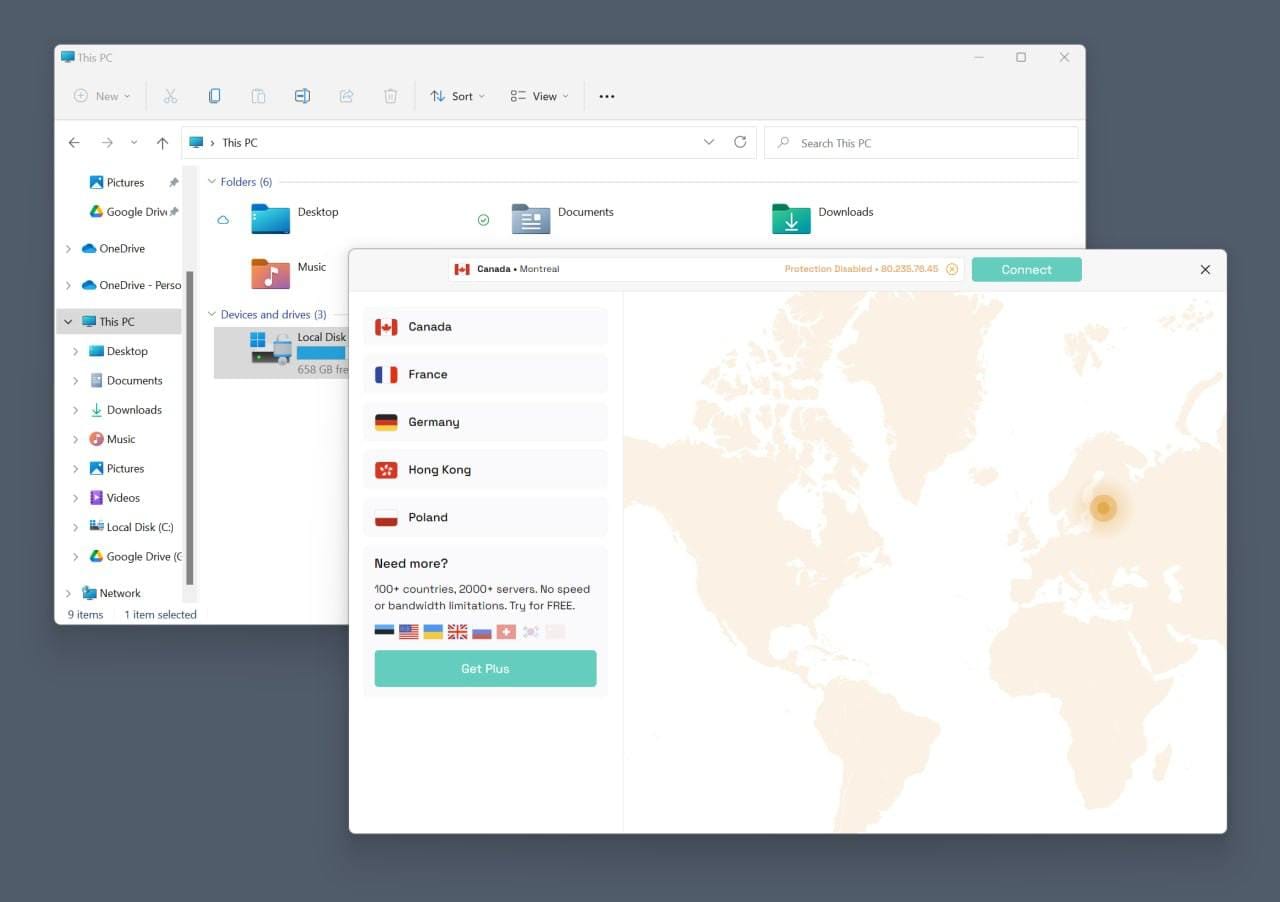
DVPN's desktop version, running on Mac (left) and Windows (right).
Platforms
DVPN is already available on iOS, Android, and Mac desktops.
The Mac version of DVPN received a complete redesign in a recent update, as NORSE made an effort to better adapt it for desktops. Prior versions had been an almost direct port of the iOS version. DVPN's debut on Windows is scheduled for this month (March 2025). That version of DVPN will be available to download both on the NORSE website and the Microsoft Store.
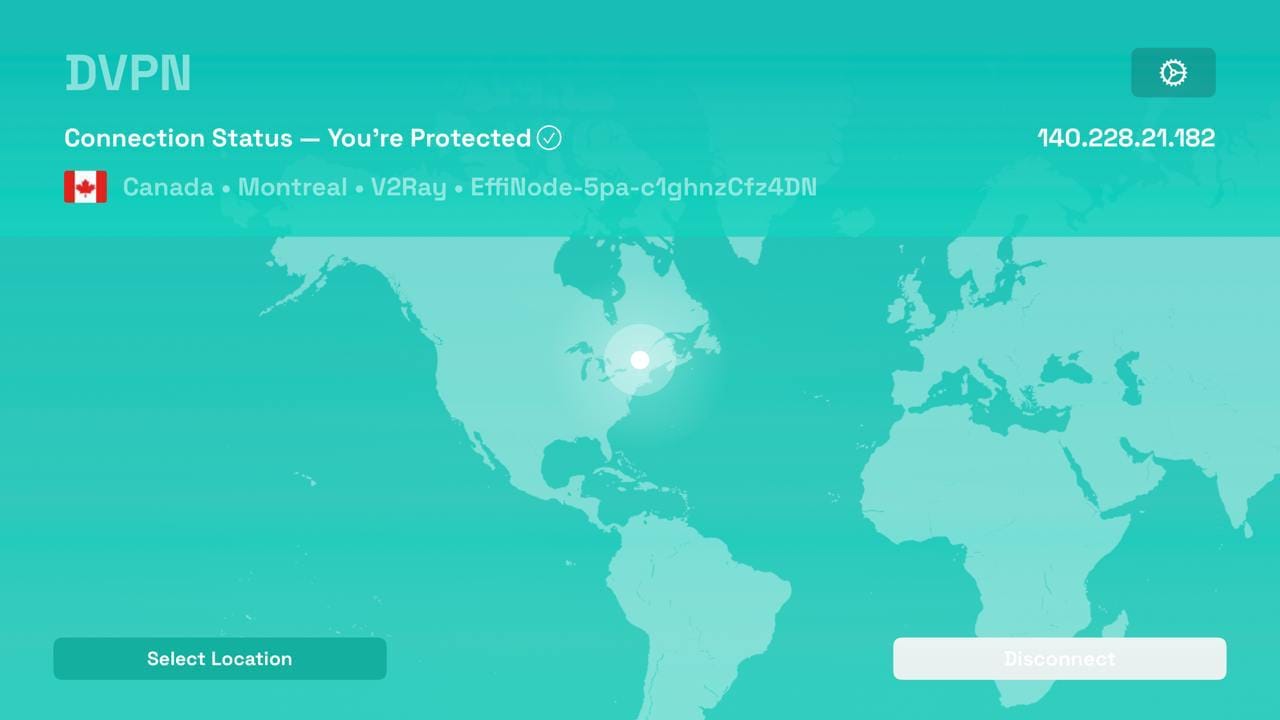
One recent focus for expansion by NORSE has been an entirely new platform which has never before received official Sentinel dVPN releases: Smart televisions. DVPN for Apple TV already went live in February, and the app will also be arriving on Android TV and Amazon's Fire OS later this spring.
In addition to those more traditional platforms, versions are also planned for some new, rather unconventional ones such as Apple Vision Pro (VR) and Apple Watches.

QuickClient and dVPN Bot
Click the link below to set up QuickClient and start using the bot now.
Get Connected (Telegram)A demonstration of dVPN Bot for Mac. [Credit: NORSE Labs]
If you start the bot (using the button above), you'll be prompted to download VPN QuickClient, a simple background app which can provide dVPN functionality through intermediary apps—the intermediary in the bot's case being Telegram. Once the background app is installed and you get connected, the messenger itself will become your dVPN app in all but name.
The release of the dVPN Bot marked the first official collaboration between the Sentinel Ecosystem and The Open Network (TON), a high-market cap blockchain project that works to add Web3 features to Telegram. Telegram founder Paul Durov, who famously underwent an ordeal with French authorities last year, had previously supported Litreev's pre-Sentinel efforts to unblock access to Telegram within Russia.
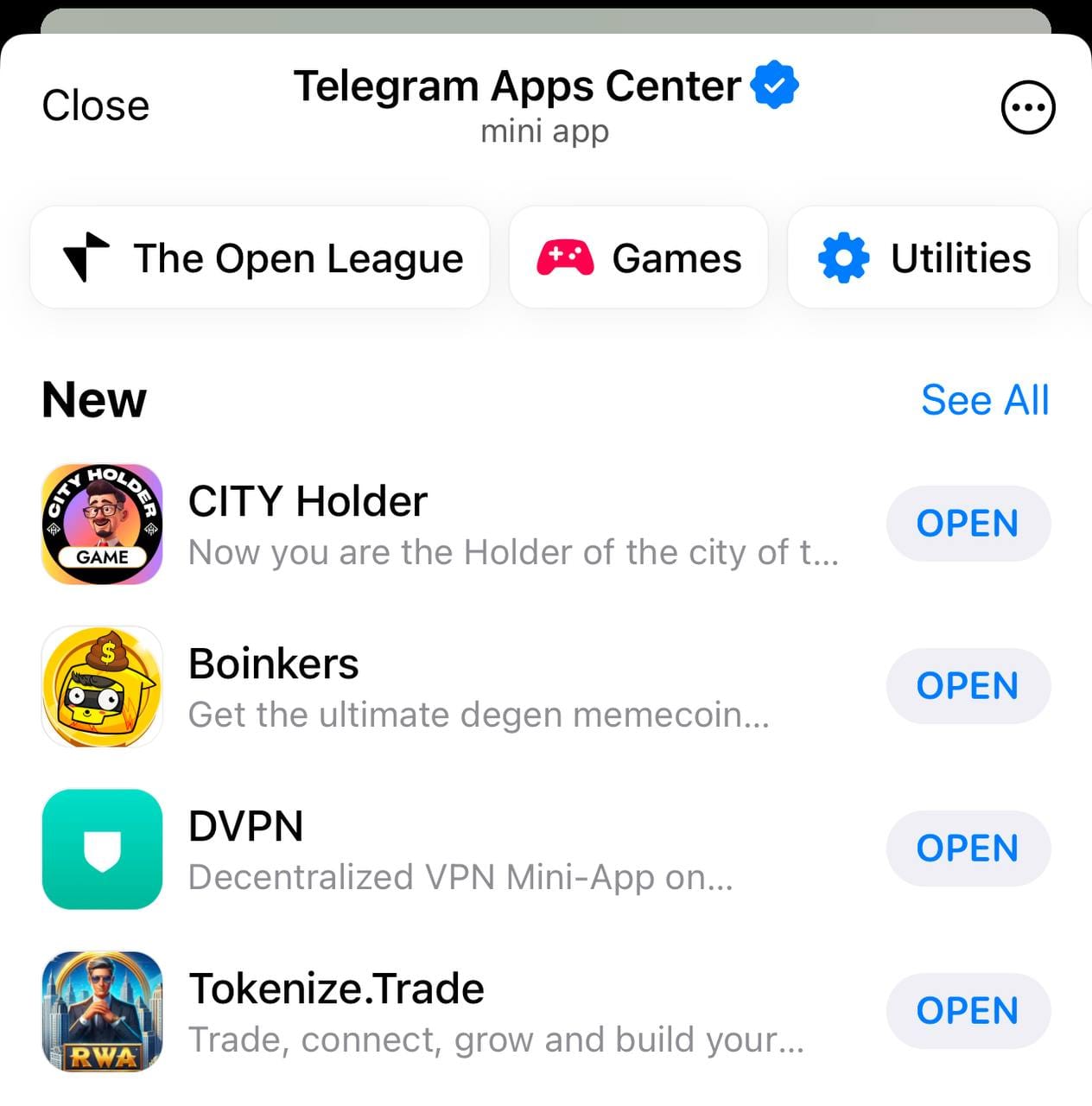
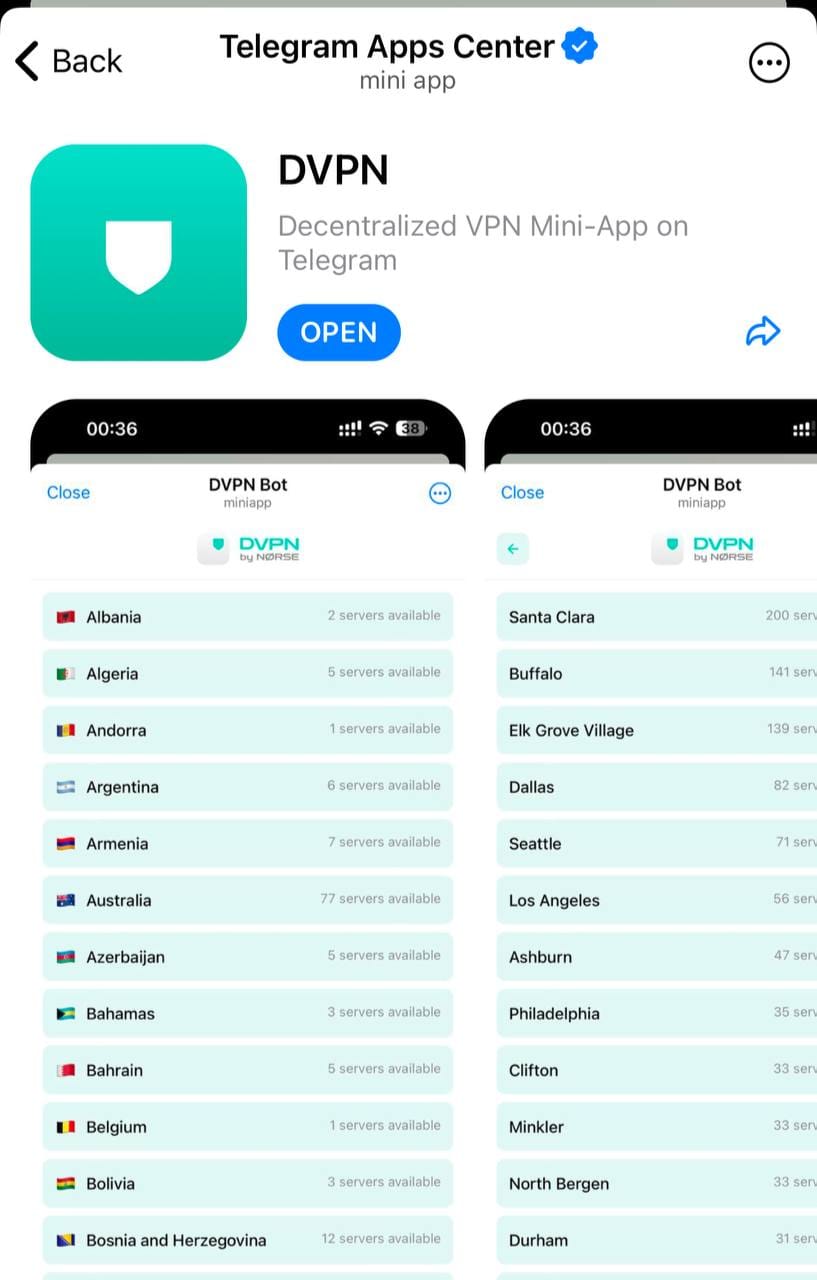
dVPN Bot on the Telegram Apps Center.
Features
- Don't think that this dVPN connection only protects your traffic within the Telegram application—your entire device is protected once it's activated.
- Much like the standalone DVPN app, the free version of dVPN Bot provides access to nodes in five countries.
- Beyond installing QuickClient, sign-up for the bot is as simple as it could be, as it has no internal account system.
- For premium users, subscription auto-renewal and full access to Sentinel's Node Network are available.
- Participant's in the bot's referral program can earn Telegram Stars, a (non-blockchain) in-app digital currency which can be used for purchasing content and services on the messenger.
Platforms
QuickClient is available for Android, iOS, Windows and Mac; meaning the bot is accessible to Telegram users on virtually every platform which the messenger exists on.
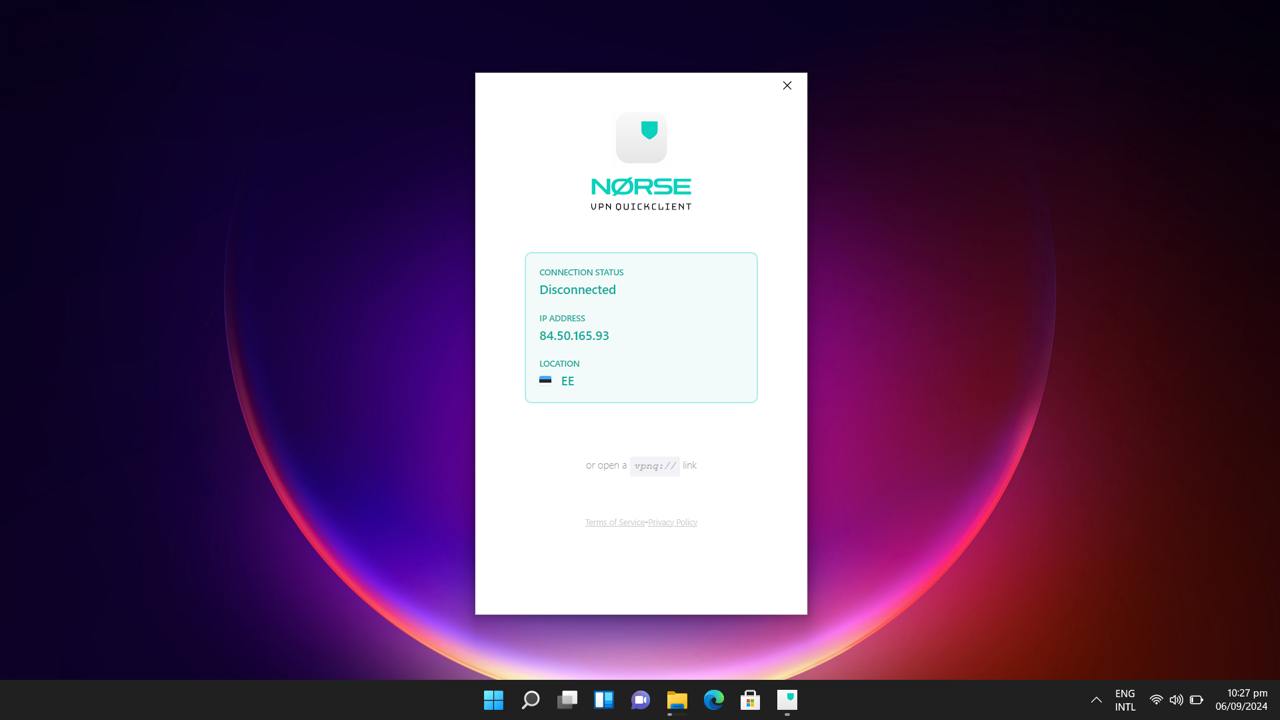
More from NORSE
Development Kits
One of Litreev's longest-standing objectives while working with Sentinel has been to create a no-code Sentinel dVPN development kit (SDK), which would allow users to create their own dVPN applications without any substantial technical skills. Once realized, this could become the catalyst for an explosion of dVPN apps which could target every conceivable demographic and market in the world.
According to a recent announcement by a Sentinel Foundation member, NORSE Labs is closer than ever to realizing this dream—it's entirely possible that we could see it launch in this calendar year.
You can track the development progress of all NORSE products and utilities at their GitHub repository below.
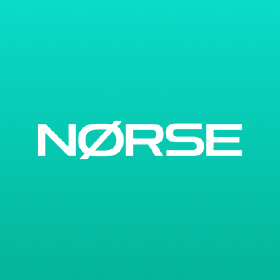
Validator & Nodes
In addition to hosting dVPN Nodes across the world which are accessible to every application in Sentinel's application network, NORSE Labs remained in control of SOLAR Labs' validator when the company rebranded. That means they are still a genesis validator of the Sentinel's mainnet Cosmos blockchain and have been signing and proposing blocks for almost half a decade.
NORSE Labs hosted a DVPN airdrop for all delegators with more than 1 million coins staked late last year. In addition to a monetary allocation, claimants received exclusive perks within NORSE products.
Cosmic Network
NORSE Labs and Aleksandr Litreev were on the frontlines in the effort to defend Sentinel against Cosmic Network's misappropriation of the project's source code late last year. Code from DVPN's predecessor, SOLAR dVPN, was also used by Cosmic Network without permission in addition to Sentinel's.
Litreev participated in heated public exchanges with personnel from Cosmic Network since the misappropriation was uncovered by Silent Solutions Limited, a cybersecurity company. He also recorded a series of videos for the Sentinel and broader Cosmos Ecosystems demonstrating how the ill-begotten code had been implemented by Cosmic.
"We believe in sharing our work to strengthen the community, but open source is not a gateway for free outsourcing without credit—it’s built on mutual respect. Our commitment to privacy, transparency, and open source principles remains unwavering. We will take action against any dishonest actors to ensure they either respect the core values of open-source or face the consequences. Mutual respect is not optional—it’s essential."
In addition to issuing statements, Litreev recorded a series of videos where he demonstrated ill-begotten code in Cosmic's applications. This valiant defense of open source values was archived for posterity by the Sentinel YouTube channel.
Our full coverage of the events, including the videos, is available at the link below.

At dVPN News, every member of the Sentinel community is a contributor. Whether you're writing articles, sharing tutorials, or participating in discussions, your involvement is what drives our collective growth, and best of all it's rewarded! Together, so if you to contribute to the growth of the Sentinel Network, you are in the right place!
Connect With Us
Stay in touch and be part of our growing community:
• Follow Sentinel on X
• Follow the Growth DAO on X
• Join the Growth DAO community Telegram Group
• Join the official Sentinel Subreddit, r/dVPN






